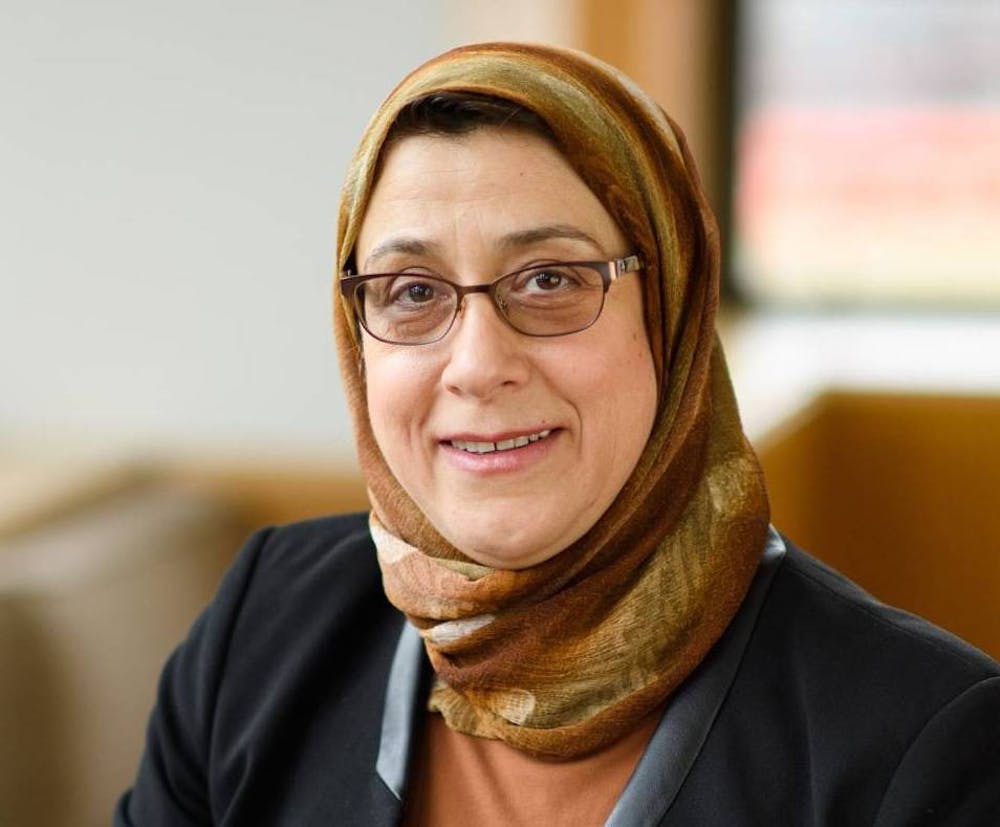Dean Amaney Jamal of the Princeton School of Public and International Affairs (SPIA) spoke about campus protests and the war in Gaza on a podcast with the Carnegie Endowment for International Peace on July 18. Jamal was in conversation with her friend and former colleague Keren Yarhi-Milo, the current Dean of Columbia University’s School of International and Public Affairs (SIPA).
The pair, while expressing some wariness towards the protesters on their respective campuses, advocated for dialogue on campus's that looked to empathize with why students are protesting. Columbia University's “Gaza Solidarity Encampment,” which started in April, led the way for similar protests across the country in the spring, including on Princeton’s campus. Demands from protesters included divestment from Israeli-backed institutions and companies.
“I’ve had students come in and say, ‘Princeton can’t be supporting genocide, what are you doing about it?’” Jamal said. “And it’s like, well, can you please explain to us, what do you mean by that?”
“It’s these students believing that we are powerful players and that we can actually talk to people who have influence on the conflict, so I have to keep reminding myself that … this is probably one of the first main political issues that they’re caring about … so let’s take this as a learning opportunity,” she added.
During Yarhi-Milo’s decade at Princeton’s SPIA as a professor, she and Jamal connected over their ties to the conflict. Jamal, who is Palestinian, said that she and Yarhi-Milo, who is Israeli, would “always talk to one another” to hear the other’s perspective on recent events. They would also provide support during difficult times.
“Fundamentally, we care about each other and our families and we understand and comprehend that we’ve been dragged into this conflict almost without our choice,” Jamal said.
Throughout the episode, Jamal and Yarhi-Milo emphasized the importance of empathy when discussing such a complicated and “emotional” issue, with Jamal highlighting a lack of “humanization” for Palestinians.
“Palestinians are still reduced to these sub-humane sort of qualities, and anybody who says ‘I’m devastated about what’s happening in Gaza’ is automatically assumed to be a Hamas supporter,” Jamal said. “When that humanization and that empathy is not happening, it creates the ingredients of a very toxic environment.”
“It has to be a goal of humanizing both sides, and it has to be more than just saying we condemn antisemitism and we condemn Islamophobia because that’s just, in my opinion, not sincere,” Jamal continued. “We have to sit with these communities and really talk to them eye-to-eye, human-to-human, and make sure that they feel heard and they are safe.”
Yarhi-Milo also said that the protesters were “not a monolith,” explaining that their knowledge about the conflict is deeper than many pundits have portrayed it to be.
“Some people said, ‘those kids don’t know what they’re talking about.’ I don’t think this is true,” she said. “I think, yes, there are going to be some people who don’t know which river and which sea, but I have a lot of very knowledgeable students who know quite a bit about the region,” she added, referencing a popular chant at pro-Palestine protests.
This isn’t the first time Jamal and Yarhi-Milo have teamed up to talk about the political climate on college campuses. In October 2023, the pair co-authored a guest opinion in The New York Times titled “The Discourse is Toxic. Universities Can Help,” arguing that universities should attempt to cultivate productive conversations rather than “retreat[ing] into their ivory towers.” They reiterated this position in a November talk on campus moderated by University President Christopher Eisgruber ’83.

Following the event, Jamal told The Daily Princetonian that universities needed to think about “new ways of fostering engagement.”
“[Students] might be screaming past one another or not listening to one another. But at some point, this is going to die down a little bit, and where are we going to be?” she asked. “What is our role as an institution to make sure that we can sort of capture those sentiments and move into something positive that fosters that analytical, policy-oriented engagement?”
That same week, students launched a petition calling for the University to divest from Israeli companies and held the first of many protests outside Nassau Hall. The demonstrations would eventually culminate in the three-week-long sit-in in McCosh courtyard and Cannon Green at the end of last semester. A total of 15 students were arrested, and another group of undergraduates staged a hunger strike demanding that University officials meet with students about divestment. The University’s Resources Committee is now reviewing a formal proposal for divestment submitted by students, faculty, and alumni in June.
“I don’t think this is over. I think actually in the fall we’re going to see a continuation, and it’s going to morph,” Yahri-Milo said.
Jamal hopes to see open dialogue between all parties involved.
“If you care about this conflict, we need to be dialoguing with one another,” Jamal said. “At the end of the day, university campuses shouldn’t be social media algorithmic outcomes where you only are in your echo chamber.”
Megan Cameron is a News contributor for the ‘Prince.’
Isabella Dail is a staff News writer and head editor for The Prospect for the ‘Prince.’
Please send any corrections to corrections[at]dailyprincetonian.com.








